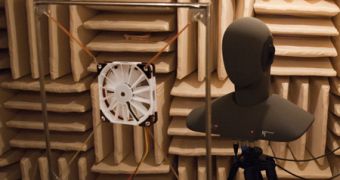“A good fan is a silent fan” could become the so-called mantra of Noctua's customers as soon as its partnership with RotoSub yields palpable results.
Since Computex 2012 is just a little over a week away, we've been seeing various announcements and leaks regarding products that will be showcased there.
The IT players taking their turn now are cooler manufacturer Noctua and noise reduction technology developer RotoSub.
Between June 06 and June 09, they will demo, among other things, a prototype fan featuring active noise cancellation technology.
ANC, also known as for Active Noise Control or Active Noise Reduction, is the method by which noise is canceled out through a process known as phase cancellation, or destructive interference. Basically, sound waves are smashed into other, undesirable sound waves.
Many headphones employ Active Noise Cancellation, but Noctua and RotoSub want fans to benefit as well, starting with the NF-F12.
"Noctua is widely recognised as a leader in quiet PC cooling, so they were the obvious candidate when we were looking for a partner to commercialise the technology we've invented," says Lars Strömbäck, RotoSub CEO.
"The performance and quality of their fans is one of the best in this industry and their new NF-F12 fan with its FocusedFlow system is ideal for integrating our ANC technology."
The system set to be showcased at Computex was invented by RotoSub's Lars Stromback and Marten Oretrop.
Called RotoSub Active Noise Control, or R-ANC for short, it lets a fan emit the sound signal that eliminated the sound produced when the propeller starts rotating.
"Our performance target is to achieve about 80% more airflow and 120% higher static pressure at the same noise level as the original NF-F12", explains Marten Oretorp, RotoSub CTO.
"There is still a lot of fine-tuning to be done, both in structural design and as far as the algorithms that compute the anti-noise signal are concerned, but we're working hard to achieve this goal within the next 12 to 18 months."

 14 DAY TRIAL //
14 DAY TRIAL //